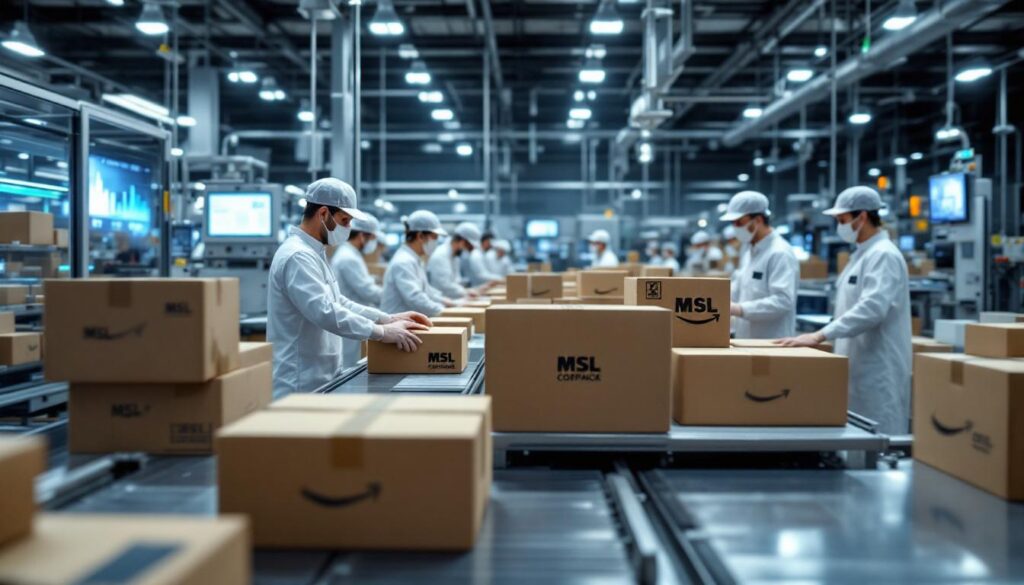![How to Outsource Your Contract Packaging Project to MSL COPACK + ECOMM in 2025 [Guide]](https://msl-indy.com/wp-content/uploads/2025/08/modern-industrial-contract-packaging-facility.jpg)
How to Outsource Your Contract Packaging Project to MSL COPACK + ECOMM in 2025 [Guide]
When brands need more flexibility and better speed to market, contract packaging makes sense. Contract packaging is when a company hires an outside expert to handle packing, kitting, or assembly for their products—saving time, labor, and facility space. MSL COPACK + ECOMM stands out because they’ve built a reputation on quality and deep supply chain know-how. Outsourcing your project to a trusted partner like MSL helps brands focus on growth while staying agile.
With MSL’s support, brands can cut costs and deliver consistent results at scale. Working with a contract packaging team means you’ll tap into specialized resources without the overhead of doing it all in-house. For brands ready to improve efficiency, boost output, and scale up, outsourcing contract packaging is a smart move. Learn more about the benefits of contract packing and why brands choose experienced partners to stay competitive.
Understanding Contract Packaging and Why Outsource to MSL COPACK + ECOMM
Outsourcing contract packaging can be a real turning point for brands looking to focus on what they do best. When you let experts handle packaging and assembly, you cut risk and set up your business for consistent growth. MSL COPACK + ECOMM delivers this advantage every day. Let’s break down what contract packaging is, why companies hand it off to specialists, and how working with MSL helps brands stay sharp and efficient.
What is Contract Packaging?
Contract packaging means working with an outside company that handles packing, kitting, assembling, or even labeling products. These services give brands an edge by letting them avoid expensive equipment, staffing, or warehousing.
This model works like an extension of your supply chain. Instead of managing everything yourself, you let a specialist take care of complex details—saving your team time and freeing up space and cash.
- Scalability: Adjust output fast without hiring new staff or buying machinery.
- Expertise: Get a team that knows industry safety standards, quality checks, and the latest technology.
- Flexibility: Use skilled resources for seasonal surges, special projects, or large rollouts.
Want a closer look at how it all works? You can check out contract packaging company for a clear, step-by-step breakdown.
Why Brands Outsource Contract Packaging
Handling packaging in-house drains time, space, and your team’s energy. Most brands face similar headaches before they shift to outsourcing:
- High labor costs, especially during busy seasons
- Pressure to shorten lead times and speed up delivery
- Outgrown facilities or lack of space for packing lines
- Costly investments in new equipment or technology
- Maintaining strict compliance and consistent product quality
Outsourcing takes these burdens off your plate. With MSL COPACK + ECOMM, brands gain instant access to skilled teams, modern tools, and well-organized processes. This means faster turnarounds, fewer errors, and reliable quality with every order.
It’s not just about saving money—outsourcing lets your brand grow without constant supply chain headaches.
Advantages of MSL COPACK + ECOMM’s Expertise
MSL COPACK + ECOMM stands out because of its specialized knowledge and strong reputation. You get:
- Decades of know-how in contract packaging for food, retail, health, and more
- Efficient lines that handle jobs of any size, from custom kits to high-volume projects
- Technology that supports traceability, advanced tracking, and compliance every step of the way
- Flexible capacity, so you never worry about volume spikes or changing demands
MSL doesn’t just fill boxes—it acts as a partner in your brand’s supply chain strategy. For a deeper dive into what sets MSL apart, see their take on the benefits of contract packing. You’ll understand why so many fast-growing brands trust their projects to a professional team.
Key Steps to Successfully Outsource Your Contract Packaging Project
Getting contract packaging right is about thoughtful planning and coordination from the start. You want reliable partners, clear expectations, and smooth execution—without any surprises. Taking the right steps early makes the difference between headaches and hassle-free results. Here’s how brands can lay the groundwork for a standout contract packaging project, with MSL COPACK + ECOMM guiding you each step of the way.
Evaluating Your Packaging Needs
A successful contract packaging project starts with knowing exactly what you need. Assessing your requirements isn’t just about the physical package or routine logistics—it’s about aligning solutions to your brand’s goals. Think about these factors before reaching out:
- Project Scope: Figure out which products you want packed, the expected volume, special promotions, or kits. Do you need labels, inserts, or bundled items?
- Materials and Compliance: Identify whether your products need food-safe, child-resistant, eco-friendly, or custom packaging materials. Check any regulatory standards you must meet.
- Special Handling: Are your products fragile, perishable, or in need of tamper-evident packaging? List temperature, humidity, or handling considerations upfront.
- Shipping and Distribution: Outline pickup, warehousing, and distribution needs. Think about turnaround times and peak seasons that might affect schedules.
Having these details ready helps you choose the right service and makes project planning more accurate from the first conversation.
Selecting the Right Contract Packaging Partner
Your choice of partner will define how smoothly your project runs and how your product lands in customers’ hands. Look for a contract packaging provider that checks these boxes:
- Experience: Proven track record packaging products similar to yours.
- Capabilities: Ability to scale up or down, add special services, or handle unique items.
- Facilities: Clean, secure, and equipped with the right technology.
- Transparent Pricing: No hidden fees—choose a team that explains estimates and pricing clearly.
- Communication: Fast response and proactive project updates.
MSL COPACK + ECOMM rises above the rest with a customer-first mindset and decades of hands-on experience. Their team has mastered everything from fast-moving consumer goods to sensitive health products. To see the full range of what they deliver, browse their Contract Packaging Services.
Requesting a Proposal and Project Planning
Once you know what you need and who you might work with, it’s time to put your project into writing. Creating a thorough Request for Proposal (RFP) and a clear plan sets the stage for smooth execution.
Here’s how to set your project up for success:
- Detail Your Requirements: Include specifics about product types, materials, quantities, special handling, and timing.
- Define Deliverables: List exactly what you expect—packaged products, assembly, shipping, storage, or any extras.
- Share Your Timeline: Outline desired production, delivery, and launch dates. Build in time for testing or small runs before the main launch.
- Budget and Flexibility: Share budget ranges and any areas where you can be flexible.
- Open Communication: Keep all parties updated on changes, questions, or issues that arise during planning.
A complete RFP not only speeds up proposals but also builds trust. Both you and your packaging partner will know what’s expected, with fewer surprises along the way.
Developing the Packaging Solution
With your plan in place, the real work gets underway. Developing your packaging solution is a hands-on, creative process that blends strategy, teamwork, and some trial and error.
Collaboration is key during this phase:
- Team Workshops: Work side by side with packaging pros to brainstorm ideas and solve problems early.
- Prototyping: Build and test sample packages. See how your products look, check if they hold up, and assess shelf appeal.
- Method Selection: Choose the packing method that best fits your needs—like shrink wrapping, bundling, or flow wrapping. Interested in your options? Learn more about Methods in contract packaging.
This open, hands-on process protects against costly mistakes and lets you stay in control of your brand image and customer experience.
Contract Finalization and Launch
With the solution tested and ready, sealing the deal and prepping for launch becomes the priority. Proper documentation and clear onboarding help avoid problems down the road.
Focus on these best practices:
- Legal Agreements: Double-check important details—pricing, timelines, penalties, and quality standards. Make sure both sides sign off before work starts. If you’re new to this process, look at these elements of contract packaging agreements for guidance.
- Quality Assurance: Set standards for inspections, samples, and reporting. Agree on how to handle returns or defects.
- Onboarding Checklist: Make sure everyone knows roles, contacts, and project milestones. Share final versions of product specs, artwork, and shipping instructions.
MSL COPACK + ECOMM uses clear communication and repeatable processes, so your project stays on track from day one. By establishing strong agreements and expectations in writing, you minimize risk and set up for a stress-free launch.
MSL COPACK + ECOMM’s Approach to Efficient Contract Packaging
MSL COPACK + ECOMM delivers contract packaging as a true partnership, putting clear communication, efficiency, and ongoing quality at the heart of every project. Customers work alongside an experienced team that values straightforward plans, timely feedback, and improvement at every stage. Here’s how MSL’s approach makes a difference for brands wanting worry-free and dependable results.
Initial Consultation and Project Assessment
Kicking off a successful contract packaging project starts with understanding every detail. MSL uses a structured initial consultation to gather the facts and expectations upfront. This stage isn’t just a box to check—it’s where the foundation for success is built.
- Discover Needs: The MSL team asks about your product requirements, target volumes, and key deadlines.
- Assess Challenges: Before work begins, they uncover potential pain points, such as special handling needs or regulatory requirements.
- Define Goals: Clear goals get set together, aligning service with your brand’s top priorities.
This approach allows MSL to tailor solutions right from the start, helping you avoid costly missteps. For specialized industries like publishing, their approach extends even further—see how it works in their book publishing contract packaging overview. If your project involves complex kitting or supply demands, MSL’s framework for kitting services for supply chain further demonstrates their consultation strength.
Transparent Collaboration and Progress Tracking
Efficient packaging relies on transparency and real-time updates. With MSL, you’re never left guessing about your project’s status. Their process builds strong client relationships by giving you regular insights into performance and timelines.
Here’s how the collaboration works day-to-day:
- Open Communication: You get dedicated points of contact who answer questions and share updates.
- Clear Milestones: Detailed project timelines and stage-by-stage reporting keep things predictable.
- Progress Tracking: MSL uses smart tools to monitor accuracy and timelines, so issues get caught early instead of after the fact.
Want more ideas for staying in sync with your packaging partner? The co-packing services guide covers tips for setting up smooth communication and monitoring performance, while boosting 3PL efficiency tips share proven tactics that help brands track and improve every shipment.
Continuous Quality Control and Optimization
MSL COPACK + ECOMM doesn’t stop at getting your first box out the door. Their contract packaging model thrives on ongoing checks and adjustments, giving brands confidence that products meet standards from start to finish.
Expect a process built for steady improvement:
- On-the-Floor Inspections: Regular sample checks and audits catch issues before products ship out.
- Customer Feedback: Quality control loops in your feedback, making it easy to request tweaks or fix problems fast.
- Data-Driven Insights: Reports and analytics allow MSL to optimize packaging efficiency and accuracy over time.
MSL brings in proven methods from across logistics, like lean management and data review, to minimize waste and maximize value. To see smart quality practices in action, check out how Lean logistics for supply chain optimization and E-commerce fulfillment: balancing speed and accuracy improve results. Their focus on quality means no surprises for your customers—just consistent, reliable delivery, season after season.
Ensuring Success: Tips and Best Practices for a Smooth Project
Strong results in contract packaging come from planning, clear communication, and an understanding of what can go wrong. Whether you’re outsourcing for the first time or managing another large rollout, a little upfront effort will help avoid delays and setbacks. Here are proven ways to help your project stay on track and meet your expectations.
Setting Clear Expectations and Communication
Smooth contract packaging projects begin with open, honest talks. From the first call, keep goals, timelines, and responsibilities out in the open. Misunderstandings can slow things down or create mistakes that cost time and money.
To make things easy:
- Set up regular check-ins with your packaging partner.
- Share updates if anything changes on your end.
- Put important decisions and needs in writing so there’s no confusion later.
- Assign clear points of contact on both sides. This way, nobody gets left in the dark and answers come fast.
- Provide samples and product specs upfront, along with any graphics, artwork, or brand guidelines.
Think of this as creating a map for your project. When everyone can see the route ahead, your team and your packaging partner spend less time backtracking and more time getting results.
Understanding Packaging Methods and Compliance
Choosing the right packaging method is more than picking what looks best. Think about protection, shelf life, ease of shipping, and cost. Your partner can recommend what’s best, but educate yourself so you can ask the right questions.
Here are five packaging methods you’ll see in contract packaging:
- Shrink Wrapping: Tight plastic film around products for protection and tamper evidence.
- Flow Wrapping: Makes tight, sealed packs with fast, automated equipment.
- Blister Packaging: Great for small consumer goods, keeping items tamper-proof.
- Clamshell Packaging: Hard plastic cases that show off products and stop theft.
- Bundling: Packs several items together, perfect for promos or multipacks.
Your choice has to meet both your product’s needs and any industry rules. Regulations might cover food safety, labeling, or even what materials you use. Make sure your contract packager is up to speed on these requirements so your products stay compliant from start to shelf.
To go deeper on wrap and seal options, check the different wrapping methods in contract packaging. And if your product will ship in bulk or needs extra protection for travel, understanding secondary packaging in contract packaging can help you make the call.
Common Pitfalls to Avoid
Brands outsourcing contract packaging often run into the same issues. The good news is, most of these can be avoided with a little attention from the start.
Watch out for these common problems:
- Unclear specs: Vague instructions cause mistakes. Offer samples and written guidelines right away.
- Missed deadlines: Rushing decisions or failing to share forecasts can lead to missed launch dates.
- Ignoring hidden costs: Ask your provider to outline all fees, from warehouse storage to change orders. Surprises here are never good.
- Not checking compliance: Missing a labeling or food safety rule could mean costly recalls.
- Picking the cheapest option: Going for the lowest bid without checking experience or quality can cost more in the long run.
Take a close look at packaging histories, references, and production capabilities. If you need to change sizes, fix packaging damage, or update bundles, using a repackaging services overview is a quick fix—so long as you planned ahead.
Success in contract packaging comes from trust and careful planning, not cutting corners. If you remember these best practices, your project will launch faster and with fewer surprises.
Conclusion
Partnering with MSL COPACK + ECOMM gives brands a true advantage. You get a team that understands the ins and outs of contract packaging and knows how to deliver on time, every time. When you choose a proven partner, you gain efficiency, save money, and free your staff to handle what matters most.
A well-executed contract packaging project is smart business. It improves your supply chain, protects your brand’s reputation, and helps you adapt as your needs grow. Consider taking the next step with a company that puts quality and service first—check out their full Contract Packaging Services for more details.
Ready to boost your brand’s speed and flexibility? Reach out to MSL COPACK + ECOMM and see how expert contract packaging can support your goals. Thanks for reading—your feedback or questions are always welcome!





